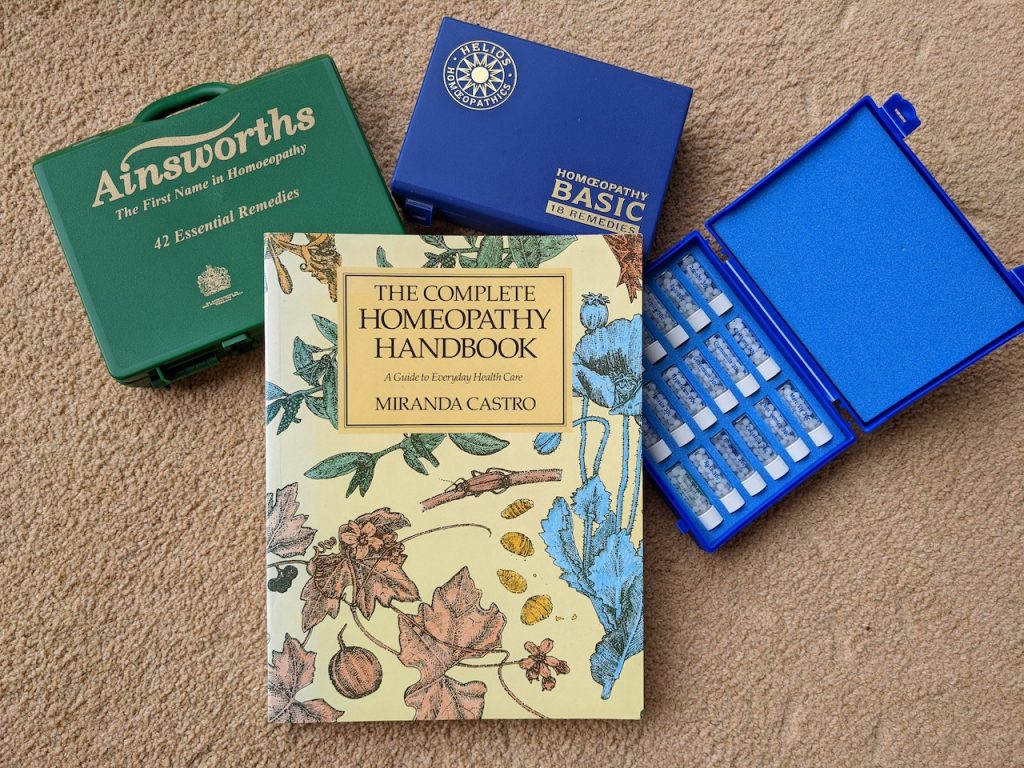You can care for your family with some basic homeopathy and a homeopathic first aid kit.
Starting mid month I am going to share with you the key characteristics of the homeopathic remedies typically found in a first aid kit.
Some homeopathic pharmacies sell first aid kits. In the photo you will see two of the best known.
Taken in alphabetic order, the first remedy will be Aconite and the last Sulphur.

To introduce this series I wish to share the words of the late Dr R A F Jack who was a NHS GP working near Bromsgrove until his retirement in 1980.
With the advent of the NHS, his practice grew. To help limit the number if night calls, he gave every family with young children four bottles of homeopathic remedies for emergencies (Aconite; Belladonna; Ipecacuanha; Chamomilla). In time this very basic kit expanded to 22 remedies.
Below, is his introductory guidance: the words are taken from his book Homeopathy in General Practice (Beaconsfield Publishers 2001 – still available).
“ I would tell the mother that there were five remarkable features about these remedies:
“In deciding which fever pills to use in a doubtful case, I used the analogy of a bunch of keys. If the first key does not fit the lock, it has harmed neither the key nor the lock, and the next key will probably work….”
*(This, incidentally has happened several times. I would tell of one occasion when a child fed all four bottles into a goldfish tank, but a week later the fish were none the worse and continued to swim about unperturbed.)
In a society used to biochemical medicine, that is to say what you get from your local chemist (prescribed or over the counter), the concept of the infinitesimal doses is a challenge.
You need to think in terms of physics and not chemistry.
Consider the homeopathic remedy as a frequency or pattern. Poetically put, music for the soul.
It is a bit like a software download.
The function of a homeopathic remedy is to stimulate an immune response to overcome the condition causing a problem.
This contrasts most orthodox medicines that interact chemically to kill bacteria or ease symptoms by suppressing the natural immune response (e.g. steroid creams for skin complaints).
Homeopathic remedies are made by a serial process of dilution and agitation (otherwise known as succussion).
By way of example, if the leaves of the stinging nettle are crushed and filtered in a mixture of alcohol and water, you have a herbal remedy. One drop of this in 99 drops of alcohol water yields the first centesimal potency labeled 1C. One drop of the 1C potency in another 99 drops of alcohol water yields the second centesimal potency or 2C and so on.
Homeopathic remedies found in the kits shown in the photograph are 30C potency. The lower 12C and 6C potencies are also suitable for first aid use.
Homeopathic medicines are initially made as liquids (termed ‘medicating potencies’) which are then dropped onto pills or tablets. These are more conventient to carry around.
Typically, first aid kits have 2g bottles containing round sugar pills.
The usual dose is one pill or tablet.
For infants, you can crush a pill or tablet between a folded piece of paper to make a powder. Or, you can buy the remedy as sugar granules which comes to the same thing (dose say a quarter teaspoon).
Another trick is to dissolve a pill in a little water (stir well) and give a teaspoon.
Dose
You can safely give 30C and lower potencies three or four times a day over a few days. In an urgent give every 15 minutes over an hour or two.
Some principles:
Do not take Homeopathic remedies over an extended timeframe without professional advice. This would not be first aid. Similarly only give a remedy every hour or less for over 1-3 hours and then tail off.
Expect to see some improvement in 24 hours and conclude treatment within 5-7 days.
Politics, I am afraid, much has changed since Dr Jack’s time. There has long been tension between different schools of thought. Dr Jack clearly found value in homeopathy as did the many doctors he taught.
However, the NHS is wedded to an orthodox western scientific model (which rightly has its place) otherwise known as Allopathy. Medical schools teach this model to the exclusion of alternatives.
In an earlier blog you can read about the difference between the Allopathic and Homeopathic approach
Consequently, knowledge of the homeopathic approach has diminished within orthodox Medicine although the Faculty of Homeopathy still exists for Doctors and Nurses. The Society of Homeopaths and Alliance of Registered Homeopaths are two lay bodies that champion Homeopathy in addition.
Other countries see things differently, especially India.